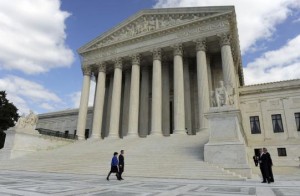This past Friday the Supreme Court made gay marriage the law of the land. Many in our church have been celebrating this ruling. Others in our church have been struggling with this development. Still others are uncertain what to think or do and are just trying to get through the end of the week with their bills paid and food on the table.
Throughout its history Sycamore Creek Church has taught little about gay marriage. I have shared about my own experience of reading about the topic and finding that there are people on both sides of this issue that I respect. I am drawn to believe that faithful Christians disagree. People who really do want to follow Jesus end up having different convictions on this particular decision. John Wesley was fond of reminding us to seek “unity in essentials, liberty in nonessentials, and charity in all things.” Of course there is disagreement among Christians about how essential or nonessential this issue is. While disagreement may be honest among Christians, we can all agree that loving those with whom we disagree is what it means to follow Jesus.
Sycamore Creek is still committed to show compassion to everyone. No matter whether you are celebrating the Supreme Court’s decision or struggling with it, we’ll do our best to show you God’s compassion in Jesus Christ. You are welcome at Sycamore Creek. You are welcome if you are gay. You are welcome if you are straight. You are welcome if you don’t know whether you’re gay or straight. You’re welcome if you’re a Democrat. You’re welcome if you’re a Republican. I have often pointed out that George W. Bush and Hillary Clinton are both United Methodists. That either scares you or it delights you.
We can find our unity and identity in something beyond the political challenges that face our country. We find our unity in the grace we all have received through forgiveness and new life in Jesus Christ. When we were baptized we died with Christ when we went under the water, and we were raised with Christ when we came up out of the water. That means that “there is one body and one Spirit, just as you were called to the one hope of your calling, one Lord, one faith, one baptism, one God and Father of all, who is above all and through all and in all” (Ephesians 4:4-6 NRSV).
In times of disagreement like this I am guided by my mentor from afar, Martin Luther King Jr. King taught during the civil rights movement that the ultimate goal was the “Beloved Community”, something like what we see in the Ephesians passage above. He described that Beloved Community as a community where blacks and whites were reconciled in friendship. His vision of the end precluded him from doing anything that would put unnecessary roadblocks or obstacles between blacks and whites becoming friends. Thus, he resisted the racism of his day with non-violent methods (as violence would create significant roadblocks to ultimate friendship).
However you are responding to the Supreme Court ruling, seek to do so in a way that does not put unnecessary roadblocks between friendships across gender identities and across ideological responses. Last week in response to the deaths of nine black people at Emmanuel AME in Charleston, I urged us to build friendships across boundaries of race, age, economic status, and gender identities. That is no less true this week than it was last week. Jesus, to the ire of most religious leaders of his day, hung out with people of all stripes and persuasions. We will too when we faithfully follow Jesus.
Here is a favorite prayer of mine that I believe everyone can pray in the coming weeks.
O God, by whom the meek are guided in judgment, and light rises up in darkness for the godly: Grant us, in all our doubts and uncertainties, the grace to ask what you would have us to do, that the Spirit of wisdom may save us from all false choices, and that in your light we may see light, and in your trustworthy path may not stumble; through Jesus Christ our Lord. Amen.
Peace,
Pastor Tom



Recent Comments